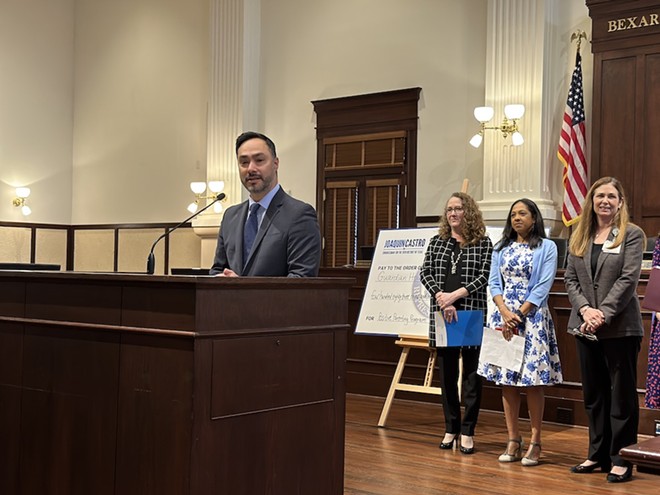Breaking the Cycle: It will take more than federal funds to solve San Antonio’s domestic violence crisis


Michael Karlis
San Antonio Congressman Joaquin Castro speaks during a press conference at the Bexar County Courthouse.
Last week at the Bexar County Courthouse, U.S. Rep. Joaquin Castro revealed that his office had secured roughly $1 million in federal funding to help combat San Antonio’s domestic violence epidemic.
Of that total funding, $472,699 will go to the Children’s Hospital of San Antonio’s Center for Miracles, a program that helps train future social workers. The remaining $483,963 will go towards the Guardian House’s Triple P Positive Parenting Program which seeks to stop the cycle of abuse at the source.
That support plus the $6.3 million allocated by the Bexar County District Attorney’s Office in 2021 to help victims of domestic abuse navigate the legal system is evidence that community leaders are finally taking San Antonio’s domestic violence problem seriously.
Even so, advocates say additional resources along with better communication between criminal courts, civil courts and nonprofits are critical to ending domestic violence in San Antonio.
“One of the main things that our community needs is a major overhaul of all of our systems that we have and how we interact with one another,” said Patricia Castillo, executive director of P.E.A.C.E. Initiative, a San Antonio-based group that helps victims of domestic violence leave their abusers. “How does the work of the civil court complement and collaborate with the work of the criminal courts? Streamlining can help us understand where the gaps are, where we’re dropping the ball, and how we can better connect.”
The conversation around San Antonio’s abuse crisis comes in the wake of a nationwide increase in domestic abuse during COVID-19. U.S. instances of abuse jumped 8.1% in the year following the imposition of lockdowns in early 2020, according to a report by the Council on Criminal Justice.
The Alamo City appears to be on the extreme end of that disturbing trend. The San Antonio Police Department experienced an 18% increase in family violence-related calls in March 2020 compared to a year prior. For the entirety of 2021, SAPD responded to more than 20,000 family violence calls, Castro said at the press conference announcing the new funding.
Signs of abuse
San Antonio is consistently ranked among the poorest U.S. metro areas, and some studies suggest poverty can be a major contributor to domestic violence since victims lacking resources are less able to break free of the cycle.
However, Castillo said the biggest factors contributing to San Antonio’s continuing abuse problem are a lack of information available to victims and poor communication between civic groups, law-enforcement agencies and nonprofit organizations.
“A lot of times, people don’t realize that once you get to the shelter, you’re going to have access to counseling and therapy,” Castillo said. “Somebody can help you file a protective order, somebody can help you file for divorce, somebody can provide you with services in Spanish. Somebody can help.”
One of the primary signs of domestic emotional abuse is when someone’s romantic partner attempts to isolate them by cutting off contact with their friends and family, according to the Collaborative Commission on Domestic Violence. That allows the abuser to control the abused partner’s intake of information.
When victims do seek help, they do so at heightened risk. When someone is trying to escape an abusive partner, their chances of being seriously injured or killed by that partner increase by 75%, according to Castillo.
“When you’re trying to get out from under the person who’s using violence against you, they’re going to come down on you harder,” she explained.
No quick fixes
The new funds allocated via the DA’s office and through other programs appear to be having an impact on the city’s domestic violence numbers. In 2021, domestic violence homicides declined by 33% in Bexar County from the year prior, according to a report from the Collaborative Commission on Domestic Violence, led by the City of San Antonio and Bexar County.
Even so, San Antonio is unlikely to see a dramatic decline in numbers until civil courts, criminal courts and advocacy groups have adopted more streamlined communication process, Castillo said.
Starting in 1991, P.E.A.C.E Initiative tried to improve its communication with local law enforcement through the nonprofit’s Family Assistance Crisis Teams, also known as FACT.
That initiative allowed volunteers to ride along with officers responding to domestic violence calls.
“[The program’s] value is that citizens are involved in helping officers do this work,” Castillo said. “They do an aspect of the work that police officers don’t want to do. [Police] don’t want to be handling emotions, they don’t want to be dealing with crying kids. They want to go in, write their police reports and move on out.”
The volunteers also were able to provide information and resources to victims, which Castillo said increased the likelihood that they would take steps to exit a dangerous situation.
However, FACT ended indefinitely during the early days of the COVID-19 pandemic due to safety and health concerns. Castillo hopes that additional federal and local funding could help the P.E.A.C.E Initiative relaunch the program.
For now, the P.E.A.C.E Initiative is working to expand outreach in other ways, including to the city’s faith community. On Valentine’s Day, hundreds of people showed up for a P.E.A.C.E Initiative event at a local church, Castillo said.
“It’s everywhere,” Castillo said. “It’s affecting the whole community.”
Follow us: Google News | NewsBreak | Instagram | Facebook | Twitter
















